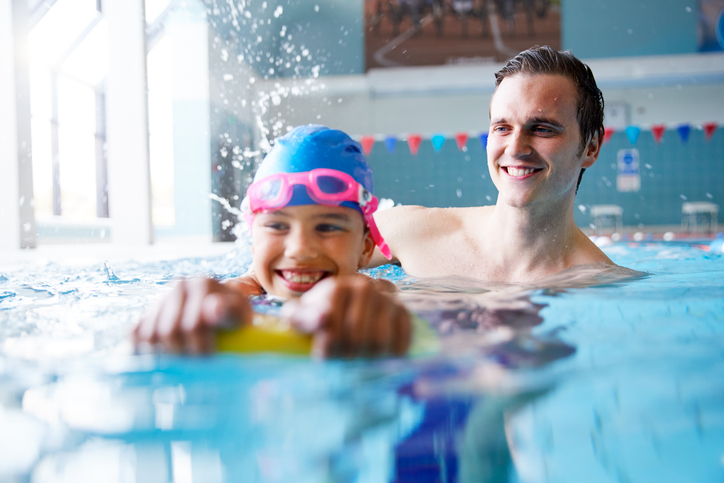Teaching my kids to swim has been one of the most rewarding—and unexpectedly enlightening—experiences of my life as a dad. It wasn’t just about ensuring they could safely navigate water; it became a journey of patience, trust, and the realization that the lessons we teach in the pool often ripple far beyond its edges. Here are the life lessons I learned along the way that, surprisingly, have as much to do with parenting and personal growth as they do with swimming.
Patience Isn’t Just a Virtue—It’s a Necessity
If I could sum up the first lesson, it would be this: things take time. When I first brought my son to the pool, I thought he would take to the water instantly. After all, it was just swimming, right? Wrong. What seemed simple to me—kicking legs, floating, moving arms—was overwhelming for him.
I quickly realized that my expectations weren’t aligned with his readiness. Each child has their own pace, and as a parent, you need to respect that. Patience became my greatest tool. I learned to take a step back, slow down, and celebrate small victories, like the day he finally dunked his head underwater without fear. It wasn’t about the end goal of swimming across the pool; it was about the tiny milestones along the way that mattered most.
Trust Is a Two-Way Street
Teaching my kids to swim taught me a lot about trust—not just their trust in me, but my trust in them. In the beginning, my daughter clung to me like her life depended on it (and in her mind, it did). She was terrified to let go. I told her over and over, “I won’t let you sink,” but her fear was stronger than my promise.
It took time, consistency, and a lot of encouragement for her to start believing me. Slowly, she learned that my arms would always be there to catch her. But what surprised me most was how much I had to trust her in return. Letting her paddle out just a little farther, watching her struggle to float on her back before she finally got it—it took everything in me not to step in too soon. Trusting her ability to figure it out was just as important as her trusting me to guide her.
Fear Is Okay, But Growth Happens When You Face It
Fear was a constant companion in those early swimming lessons—mostly theirs, but sometimes mine too. My youngest was terrified of the deep end, even if I was right there holding her. Every time we got closer, she would grip me tighter, shaking her head and refusing to move forward.
Instead of pushing her, I started talking to her about fear. I told her it’s okay to feel scared but that bravery means trying anyway. I didn’t force her, but I didn’t let her avoid it either. Over time, we worked our way closer. One day, she finally let go of me in the deep end, and the look of pride on her face was unforgettable. That moment reminded me that growth doesn’t happen in the comfort zone—it happens just beyond it.
Consistency Beats Perfection
At first, I thought teaching my kids to swim would require some grand, magical moment where everything clicked. I waited for that dramatic breakthrough, the one where they’d suddenly swim confidently across the pool. But that’s not how it happened.
Instead, progress came through consistency. Weekly trips to the pool, repetitive drills, and lots of practice added up over time. Some days felt like we weren’t making progress at all, and other days brought tiny breakthroughs. But the key was showing up, over and over again. It’s the same with parenting in general—big changes often come from small, consistent efforts.
Letting Go Is Hard, But It’s Necessary
The first time I let go of my son in the water, I thought my heart would stop. It’s counterintuitive to let go of your child when every instinct screams at you to hold on. But I knew I had to. If he was ever going to learn to swim, he needed to feel the water on his own.
That moment of letting go, of trusting the process even when it made me uncomfortable, taught me a valuable lesson about parenting. As much as I want to protect my kids from every challenge or failure, I can’t. Letting them struggle, even just a little, is necessary for their growth. It’s one of the hardest things I’ve ever had to do, but it’s also one of the most important.
Progress Isn’t Linear—and That’s Okay
There were days when everything clicked. My kids would swim a few strokes on their own, and I’d think, “We’ve got this!” But the next day, it was like they forgot everything we’d practiced. Regression was frustrating—for them and forme.
But I quickly learned that progress isn’t a straight line. It’s more like a wave, with ups and downs along the way. Accepting this made the whole experience less stressful. We didn’t need to move forward every single session. What mattered was that we kept going.
Celebrate the Small Wins
When my daughter floated on her back for the first time, I cheered like she’d won an Olympic medal. To her, it was just floating, but to me, it was proof of her hard work and courage.
Teaching my kids to swim taught me to celebrate the small wins—not just in the pool, but in life. Those little moments of progress, the ones that might seem insignificant, are actually huge. They build confidence and remind us that we’re moving forward, even when the big picture feels overwhelming.
It’s About More Than Swimming
At the end of the day, teaching my kids to swim wasn’t just about swimming. It was about building their confidence, teaching them resilience, and showing them that they’re capable of more than they realize. It was about spending time together, overcoming challenges, and creating memories we’ll always treasure.
The Ripple Effect
The lessons I learned during those swimming sessions didn’t stay at the pool. They’ve shaped how I parent, how I approach challenges, and how I view growth. I’ve learned to be more patient, to trust my kids more, and to let go when it’s time. I’ve learned to embrace fear, celebrate small victories, and show up consistently, even when progress feels slow.
Teaching my kids to swim was one of the hardest—and most rewarding—things I’ve ever done. It wasn’t always smooth sailing, but it was worth every moment. Because in the end, it wasn’t just about teaching them to swim—it was about helping them grow into strong, confident individuals who believe in themselves. And isn’t that what being a dad is all about?


